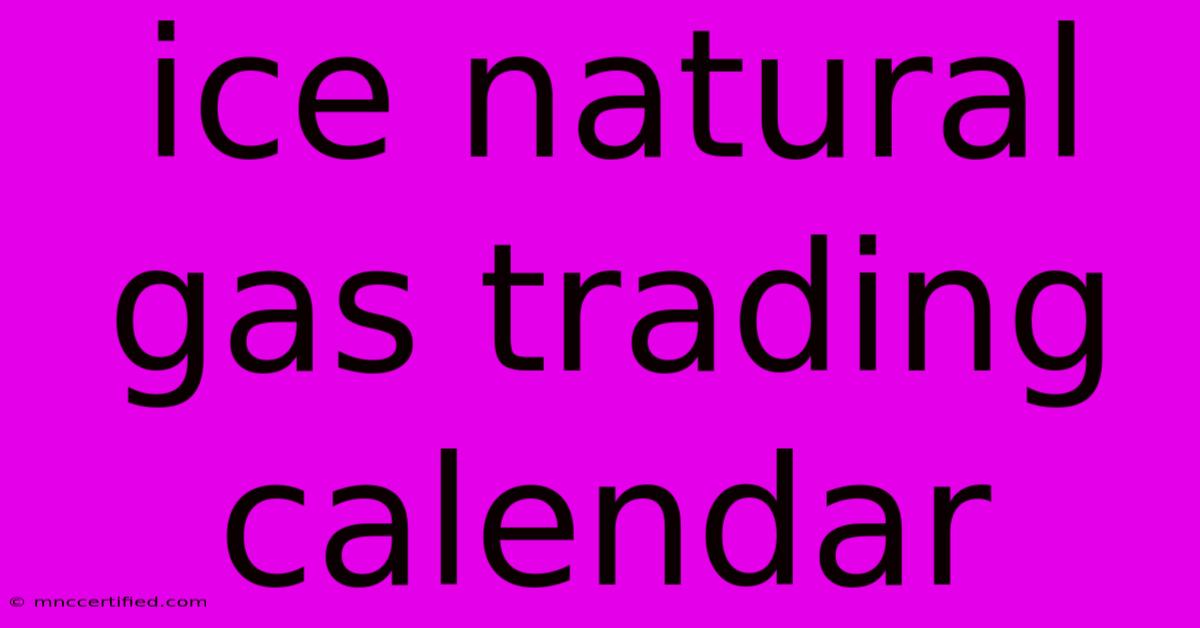Ice Natural Gas Trading Calendar

Table of Contents
Ice Natural Gas Trading Calendar: Your Guide to Navigating the Market
The natural gas market is dynamic and complex, influenced by factors ranging from weather patterns to geopolitical events. Successfully navigating this market requires a deep understanding of trading schedules and market dynamics. A crucial tool for any trader is a comprehensive ICE natural gas trading calendar. This guide will explain the importance of this calendar and how to effectively utilize it for informed trading decisions.
Understanding the ICE Natural Gas Market
The Intercontinental Exchange (ICE) is a leading global marketplace for various commodities, including natural gas. ICE natural gas futures contracts are among the most actively traded in the world, offering a benchmark for pricing and risk management. These contracts are standardized, ensuring transparency and liquidity. Understanding the trading calendar is paramount to participating effectively.
Key Features of the ICE Natural Gas Trading Calendar
The ICE natural gas trading calendar provides critical information including:
- Trading Days: Specifies which days of the week and year the market is open for trading. Note that holidays and other market closures are clearly indicated.
- Trading Hours: Details the exact times when trading is permitted, allowing traders to plan their activities accordingly.
- Contract Months: Lists the available delivery months for natural gas futures contracts. Understanding the contract months is essential for hedging and speculation strategies.
- Last Trading Day: Identifies the final day for trading a specific contract month. This is crucial for avoiding potential losses due to contract expiry.
- Settlement Prices: Specifies how the final price for a contract is determined at the end of trading.
How to Use the ICE Natural Gas Trading Calendar Effectively
Effectively utilizing the ICE natural gas trading calendar involves more than just glancing at the dates and times. It's about strategic planning and risk management.
1. Planning Your Trading Activities:
The calendar allows you to proactively schedule your trades, avoiding the rush of the last trading days. This reduces the risk of making impulsive decisions based on market volatility.
2. Hedging Strategies:
Understanding the contract months allows for effective hedging strategies. Companies can utilize futures contracts to protect against price fluctuations in their natural gas supply.
3. Monitoring Market Sentiment:
By closely following the calendar, you can track the approach of contract expirations and identify potential periods of increased market volatility. This allows you to adjust your trading strategies accordingly.
4. Avoiding Trading Gaps:
Awareness of market holidays and trading closures helps you avoid situations where you might miss out on opportunities or experience unexpected gaps in your trading activity.
Finding the ICE Natural Gas Trading Calendar
The official ICE website is the best source for the most accurate and up-to-date natural gas trading calendar. Remember to regularly check for updates, as changes can occur.
Beyond the Calendar: Factors Influencing Natural Gas Prices
While the calendar provides crucial timing information, remember that several other factors significantly impact natural gas prices:
- Weather: Extreme temperatures (both hot and cold) significantly influence natural gas demand, affecting prices.
- Supply and Demand: Changes in production, storage levels, and overall consumption directly impact price movements.
- Geopolitical Events: Global events can create uncertainty and volatility in the market.
- Economic Conditions: Overall economic growth and energy consumption patterns affect demand.
Conclusion: Mastering the ICE Natural Gas Trading Calendar for Success
The ICE natural gas trading calendar is an indispensable tool for anyone involved in trading natural gas futures. By understanding its features and using it strategically, traders can improve their risk management, enhance their trading strategies, and ultimately increase their chances of success in this dynamic market. Remember to always stay updated with the latest information from the official ICE website and consult with financial professionals for personalized advice.

Thank you for visiting our website wich cover about Ice Natural Gas Trading Calendar. We hope the information provided has been useful to you. Feel free to contact us if you have any questions or need further assistance. See you next time and dont miss to bookmark.
Featured Posts
-
Investment Property In Austin Tx
Nov 22, 2024
-
Another Death Uk Methanol Poisoning
Nov 22, 2024
-
Maura Supports Coleen Rooney
Nov 22, 2024
-
One Piece Trading Cards For Sale
Nov 22, 2024
-
President Elect Trumps Briefings Begin
Nov 22, 2024